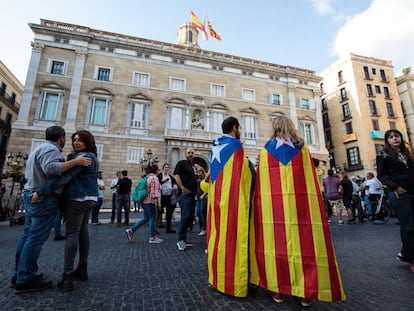Never again
After the intervention of the central government, Catalan civil society has got back its voice, its streets and its institutions

Hundreds of thousands of Catalans showed on Sunday that the demonstration held on October 8 was not just a fleeting response to the pro-independence movement. The streets of Barcelona were once again packed with protestors, who made it abundantly clear how comfortable they feel within the framework of the Spanish Constitution, and, above all else, that they are not prepared to give the hegemony of the street to the pro-secessionists. Without the structure, financing or institutional support that the so-called “process” has enjoyed, the pro-unity association Sociedad Civil – which called Sunday’s march – has destroyed the myth that the Catalan people aspire to break away from Spain. After Sunday, the process will never again be able to usurp the name of Catalonia as it has done until now.
Catalonia has shown that its society is much more plural than the pro-independence bloc would have had us believe
Against this difficult backdrop, Catalonia has shown that its society is much more plural than the pro-independence bloc would have had us believe. Plural and united with its country, Spain, which it has always enriched with its entrepreneurial character, its language, its culture and its good sense. In the face of the “Spain is robbing us” view, there is another Catalonia, which is in the majority, and is willing to air its Spanish-ness and adherence to the Constitution without feeling ashamed. What was seen in Barcelona on Sunday represents a new defeat to the secessionism that could be a prelude to what could come at the regional elections on December 21.
This is a decisive moment. It is time to return to real politics, to an approach that adheres to the law and does not repress dissenters, one that attends to the interests of citizens instead of organizing demonstrations of force in the streets – a strategy, let us not forget, that was started by the pro-independence bloc, and a strategy that has now mobilized the once-silent majority.
The weeks that are left until December 21 will not be easy. Carles Puigdemont has called for stubborn resistance in the face of Article 155, which he has described as an “assault on Catalans.” Puigdemont has not even recognized his own dismissal, just as he does not recognize himself as the aggressor who has caused such serious harm to Catalonia.
The much-desired reconciliation among Catalans will take some time to return, as will peaceful coexistence and an order of different ideals
If Article 155 is applied with restraint, with determination and with intelligence, it is very likely that Catalonia will soon return to institutional normality, but a lot more time will be needed to heal the open wounds left by the process within Catalan society. The much-desired reconciliation among Catalans will take some time to return, as will peaceful coexistence and an order of different ideals, free from labels and prejudice. One of these must come as soon as possible: the supporters of the Spanish Constitution are not anti-Catalan extremists nor from the far right.
It is worth remembering that it was not Puigdemont, but rather the application of the Constitution, that has called Catalans to the ballot boxes – the real ballot boxes. The pro-independence cry of “we will vote” in defense of an illegal referendum, held with no democratic guarantees, has turned against them. The pro-secession bloc must understand that its aspirations, while it doesn’t abuse the law, are as legitimate as those of the other side, and that it now has the opportunity to measure its levels of support where democratic forces do so: at the polls. Its abuses have favored the unity of action of the opposition, another element that underpinned the pro-secessionist defeat. The social majority must mobilize to win with its votes, so that the nightmare that Catalonia is still living through never returns.
English version by Simon Hunter.
Tu suscripción se está usando en otro dispositivo
¿Quieres añadir otro usuario a tu suscripción?
Si continúas leyendo en este dispositivo, no se podrá leer en el otro.
FlechaTu suscripción se está usando en otro dispositivo y solo puedes acceder a EL PAÍS desde un dispositivo a la vez.
Si quieres compartir tu cuenta, cambia tu suscripción a la modalidad Premium, así podrás añadir otro usuario. Cada uno accederá con su propia cuenta de email, lo que os permitirá personalizar vuestra experiencia en EL PAÍS.
En el caso de no saber quién está usando tu cuenta, te recomendamos cambiar tu contraseña aquí.
Si decides continuar compartiendo tu cuenta, este mensaje se mostrará en tu dispositivo y en el de la otra persona que está usando tu cuenta de forma indefinida, afectando a tu experiencia de lectura. Puedes consultar aquí los términos y condiciones de la suscripción digital.










































